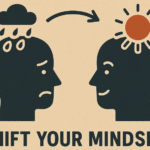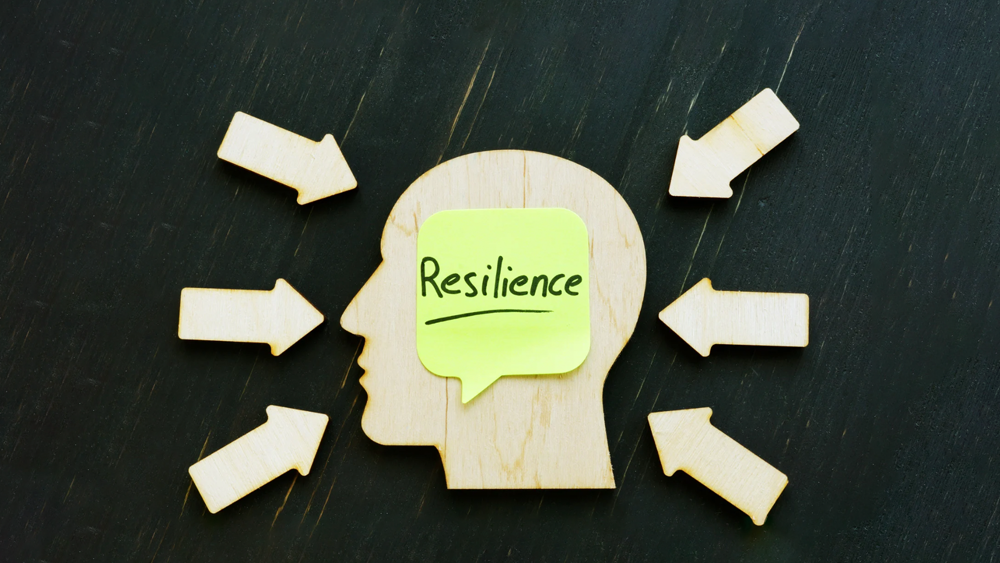There’s this moment when everything you thought you knew about yourself gets stripped away. Maybe it happens slowly, like watching your confidence erode one small failure at a time. Maybe it hits all at once, some crisis that rearranges your entire understanding of who you are.
You’re standing there, bleeding from wounds you can’t see, wondering if you’re strong enough for this. Wondering if anyone is.
Here’s what nobody tells you about resilience: it’s not some mystical quality you either have or you don’t. It’s not courage or charisma coded into your DNA. Resilience is a shock absorber. And like any shock absorber, you can build it, strengthen it, replace it when it wears out.
At MAPC (more on this soon), I’ve broken down what actually makes people unbreakable and perform better into four mindset pillars: resilience, agency, positivity, and gratitude. Not pretty concepts to hang on your wall. Tools that work when everything else falls apart.
Resilience is the first pillar because without it, the others crumble. It’s your capacity to absorb impact without losing your ability to keep moving forward. But building it means facing parts of yourself you’d rather ignore.
The War Inside Your Head
Your mind is either your greatest weapon or your most ruthless enemy. There’s no neutral ground here.
Most people let their thoughts run wild when pressure hits. They create elaborate catastrophes that haven’t happened yet, then live inside those imagined disasters until they can’t move at all. Their shock absorbers are shot before the real impact even arrives.
The people who make it through have learned something brutal: you are not your thoughts. You’re the person watching them, deciding which ones deserve your attention.
- Practice zen meditation to improve your focus – Sit with the noise in your head long enough to realize you don’t have to believe everything you think. Five minutes of facing your mental chaos teaches you more about control than five years of avoiding it.
- Tackle challenges with a step-by-step approach – Your brain can’t process “my whole life is falling apart,” but it can figure out “what do I need to do in the next hour?” Break the overwhelming into the manageable, or it will break you.
- Take mental breaks to recharge your mind – Not scrolling through your phone or numbing yourself with distractions. Actual restoration. Your mental energy runs out just like physical energy. Pretending it doesn’t makes you weak when you need to be strong.
- Ask for help when you need it – Your ego wants you to suffer alone. Your success requires you to be smarter than your ego. The strongest people I know have learned to reach out before they’re drowning.
- Learn to overcome negative self-talk – That voice in your head telling you you’re not enough? It’s not telling you the truth. It’s telling you the story that keeps you small, keeps you safe, keeps you exactly where you are.
Your Body Remembers Everything
Every shortcut you’ve taken with your health lives in your flesh and bones. Every missed workout. Every meal grabbed on the run. Every night you chose exhaustion over sleep.
Your body is keeping score, and the bill always comes due.
Physical resilience isn’t about becoming some fitness model. It’s about building a foundation that can carry you through whatever hell comes next. It’s about having reserves when life decides to empty your tank.
- Get 7-9 hours of quality sleep each night – This isn’t negotiable. Your brain processes trauma and builds new neural pathways while you sleep. Cheat here and everything else becomes harder than it needs to be.
- Drink plenty of water throughout the day – Your performance, your clarity, your ability to think under pressure – all of it depends on something as simple as staying hydrated. Most people are walking around dehydrated and wondering why they feel like garbage.
- Don’t stress about things you have no influence over – Save your energy for battles you can actually win. Everything else is just noise that weakens your shock absorbers before real impact arrives.
- Eat more veggies, healthy fats and antioxidants – Stop eating like your body is a garbage disposal. Real food is fuel for peak performance. Processed garbage is fuel for mediocrity.
- Aim for at least 30 minutes of exercise most days – Move your body to remember what strength feels like. Not to punish yourself for being human, but to remind yourself what you’re capable of when you stop making excuses.
The People Who Catch You
Most people pull away from others exactly when they need connection most. Like isolation is some kind of noble suffering.
It’s not noble. It’s self-sabotage. It’s stupid.
Social resilience means building relationships before you’re desperate for them. It means learning to be real with people who’ve earned that trust. It means showing up for others when they’re struggling, not just when it’s convenient for you.
- Open up about your experiences to someone you trust – Tell people what’s actually happening in your life, not just the highlight reel you think they want to see. Vulnerability is not weakness. It’s the price of authentic connection.
- Give someone your full strength when they speak – Listen when others talk to you. Really listen. Stop waiting for your turn to perform and start hearing what’s actually being said.
- Find a supportive friend group based on shared values – Connect around things that matter to you instead of just filling time with people who drain your energy. The company you keep either elevates you or erodes you. Choose accordingly.
- Help others through volunteering – When you remember you’re part of something bigger than your own problems, your perspective shifts in ways that can save you. Service isn’t charity. It’s perspective training.
- Call or text a friend to chat – Check on people who are going through rough patches. The connection you build today might be what carries you through tomorrow’s breakdown.
Feeling Without Drowning
Most people either stuff their emotions down until they explode or get so consumed by feelings they can’t function. Both approaches make you weaker.
Emotional resilience means learning from your ups and downs instead of just surviving them. It’s about feeling everything without letting anything destroy you. It’s about building shock absorbers for your heart.
- Learn daily life lessons from your ups and downs – Every experience is information about who you’re becoming. Mine it for what it can teach you, or waste it on self-pity. Your choice.
- Talk to yourself out loud about your daily feelings – It sounds insane, but it forces you to name emotions instead of just drowning in them. What you can name, you can tame.
- Write your thoughts in a journal or notebook – Get the chaos out of your head and onto paper where you can see it clearly. What lives in your mind controls you. What you put on paper, you can control.
- Practice small moments of gratitude each day – Not some generic “I’m blessed” performance, but specific recognition of actual good things happening right now. Train your brain to notice what’s working, not just what’s broken.
- Breathe with intention when you feel heavy or sad – Your breath is the one thing you can always control. Use it as an anchor when everything else feels like it’s falling apart.
The Uncomfortable Truth
Building resilience hurts. It requires you to face the parts of yourself you’ve been running from. It means doing hard things when you feel like garbage. It means being honest about weaknesses you’ve been hiding from everyone, including yourself.
But here’s what I’ve learned from walking people through their worst moments: the person who builds these four areas doesn’t just survive challenges. They use them as raw material for becoming someone stronger.
Your current struggle isn’t some cosmic punishment. It’s a test of your shock absorbers. Every time you choose to build instead of escape, you’re literally rewiring your capacity to handle whatever comes next.
Life will test you again. That’s not a threat, it’s a promise.
The only question is whether you’ll have the resilience to absorb the impact and keep moving forward.
The answer to that question gets decided right now, in this moment, with the choices you make when no one else is watching.
Stay safe.
And don’t forget to be awesome.







